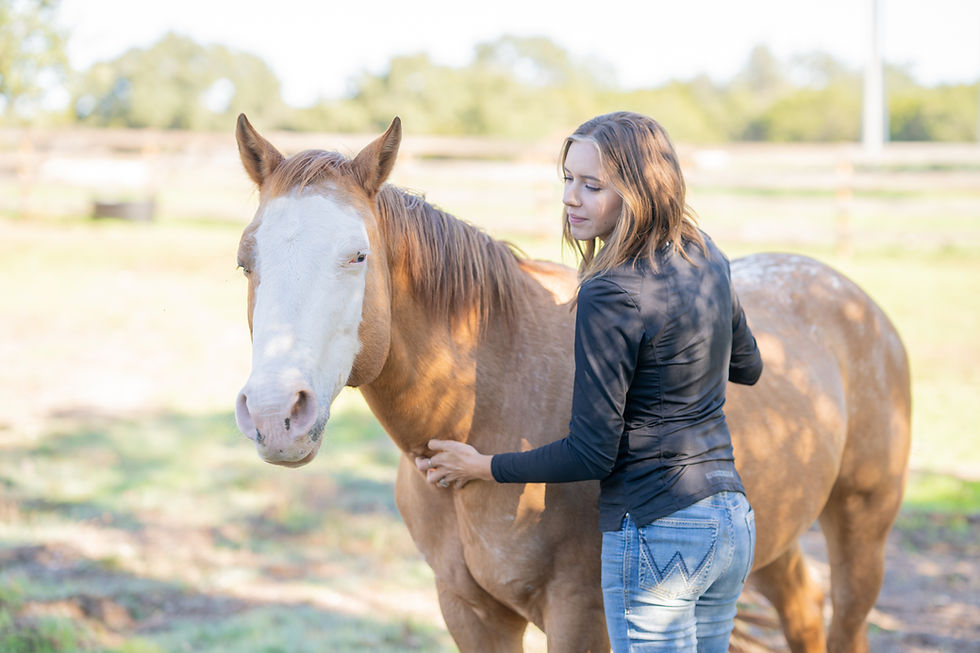How To Work With Others
- Adele Shaw
- Jan 10, 2019
- 4 min read
Updated: Feb 27, 2021

How to work with others, especially hired professionals, that don't use R+...
As your horse's caregiver you are responsible for not only how you train and care for your horse, but also how others do. Whether it's your vet, your farrier, friends visiting the barn, the barn staff... your horse has no control over how they are interacted with; that's a responsibility that falls on your shoulders. It's up to you to ensure your horse is handled safely and humanely. It's also up to you to prepare your horse in such a way that the people around them feel safe and as low stress as possible; for both the sake of the person and of your horse. If the human feels safe and in control in the presence of your horse they won't feel the need use punishment or harsh methods.. which then benefits your horse. But still, there are times where professionals or other equestrians may be inclined to interact with your horse in a way that you don't care for or you feel is unnecessary. In these situations I recommend doing the following.
1. Remember they are working for you. While they don't HAVE to work for you and you should always be respectful of their safety and needs, it IS okay to politely instruct the professional how you would like them to interact with your horse.
2. Help the professional out by preparing your horse! You can't expect a farrier to train your horse to stand quietly for a trim when they only interact once every six weeks for short time with your horse, and on top of that have a job to do while staying safe. 3. If you have a horse that is still learning, let the professional know you have a specific training program in the works and will be helping to make the appointment as low stress as possible. For example, when my vet comes to examine or treat my horses we spend a few minutes talking about where the horse is in the training process, how I would like the appointment to go, and I actively participate in the appointment; making everything as low stress and easy for the vet and horse as possible.
4. If the professional is stepping outside of their "area" of expertise.. such as a farrier giving training advice... listen attentively, let them know you appreciate the advice, but that you have a training plan.. and, if you are, let them know you're working with a professional trainer. I would also encourage you to ask them to tell you if there is a specific behavior they would like you to work on with your horse to make their job easier; this will help put their mind at ease that things will get better and they aren't expected to do things outside of the scope of their job description (like many are).
5. If you've done everything in your power to prevent it and still the professional strikes your horse or handles them in a way you do not care for, don't hesitate to ask them polietly but confidently to stop; regardless of your experience level or your age. This is YOUR horse and you are THEIR caregiver and the professional works for YOU. If they continue despite your requests.. consider finding someone else.
6. If the professional is a trainer and you do not care for how they are training your horse. Refer back to point number one, but also remember your trainer trains the way they train.. you can ask for slight changes but I don't recommend trying to change everything about the way they do things. Instead, it may be time to find a new trainer.
7. If you end up having to look for a new professional, please be sure to inform the one you're not working with anymore why. Be polite and kind, but be straight forward with them about your reasons; this will help them in the future learn where they can improve and how to keep future clients happy. For me, currently all the professionals I work with do not train or handle their horses the way I do. Some may even be *against* it, but it's hard for them to say anything or even have reason to say anything when my horses are nothing but easy and safe to interact with.
There have been times where issues have surfaced that needed addressing.. like the time my now two year old filly kicked at my trimmer as a yearling. Whoops. But I was standing right there and the trimmer knew that I didn't use punishment, so she stepped aside while I immediately jumped into a problem solving/training session with the yearling while sending the trimmer off to work on a more experienced horse.
Later, the trimmer came back and we proceeded to finish up the trim safely and without further incident, but THAT is the kind of thing I believe most professionals respond well to. A proactive owner that respects that the professional has a job to do, but also needs to be safe. You just need to show them that you are of that mindset; willing to do what it takes to keep everyone safe and happy, including your horse.
- Adele




